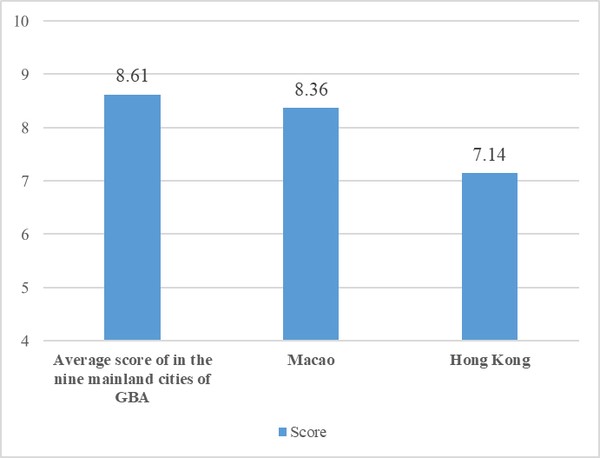Author: Ka Ho Mok, Chair Professor, Lingnan University, Hong Kong
To understand how citizens in China assess their local governments’ crisis management capabilities, particularly against the present global health crisis, the Joint Research Centre by Lingnan University and South China University of Technology, conducted a study entitled “Greater Bay Area mainland residents’ evaluation of COVID-19 measures and impression of Hong Kong and Macau” in April 2020. The survey shows that mainland residents in the Great Bay Area (GBA) believe their local governments to be more effective in measures of epidemic prevention compared to the Hong Kong and Macau governments.
The online questionnaire was conducted in early April, and successfully surveyed 1,040 mainland residents aged 18 or above living in the nine mainland cities of GBA (including Guangzhou, Shenzhen, Foshan, Dongguan, Zhuhai, Zhongshan, Huizhou, Jiangmen and Zhaoqing). With 10 being “very good” and 0 representing “not ideal”, the survey invited respondents to give scores to medical staff, their local governments, and the Hong Kong and Macau governments on their performance of epidemic prevention.

The results show that medical staff received the highest score of 9.41. As for the governments in the GBA, Hong Kong and Macau, mainland governments had the best score with an average of 8.61, with Zhuhai getting the highest mark (8.88) followed by Dongguan (8.81). In regard to Hong Kong and Macau, the government of Macau scored 8.36, and Hong Kong scored 7.14. (see Table1).
In regard to the epidemic situation, the survey also shows that over 80 per cent of respondents (80.67%) agreed that mainland China should provide Hong Kong with protective materials, such as face masks, to help the city fight the epidemic. This is perhaps because the epidemic situation has become stable in the mainland while Hong Kong continues to face greater challenges, especially a comparative shortage of protective materials. In addition, more than 60 per cent of respondents (63.46%) believe that Hong Kong and Macau citizens diagnosed with COVID-19 in the mainland should be entitled to the same free medical services that are available in their local cities. Obviously, GBA mainland residents’ evaluation of epidemic prevention in Hong Kong was not negative, as the scores were only slightly inferior than that of the mainland and Macau. However, he stresses that GBA mainland residents’ overall impression of Hong Kong is what requires our attention.
Meanwhile, the survey also asked GBA mainland residents to share their perceptions about Hong Kong as a world city. The survey also asked participants to evaluate their overall impression of Hong Kong and Macau. The results reveal that most respondents perceive Hong Kong to be “an economically developed city” (83.36%) , “a highly international city” (85%), “a shopping paradise” (83.55%) and “an open city” (68.85%). However, when evaluating whether Hong Kong is “a city with good social management”, “a safe city”, “an inclusive city” and “a friendly city”, the scores were relatively low, with responses of 25.1%, 16.16%, 29.81% and 30.96% respectively.
The above findings clearly show a majority of respondents rated positively the degree of economic development, internationalisation, convenient shopping and openness of Hong Kong. However, they had reservations about the “urban governance”, “safety”, “inclusiveness” and “friendliness” of the city. As tourism is one of the important pillar industries of Hong Kong, whether tourists agree that it is “socially well managed”, “safe”, “inclusive” and “friendly” will have a direct impact on their willingness to visit the city. This could affect consumption and, in turn, have a profound influence on the city’s development.
The present study provides insights for policy makers in the city-state. After the epidemic, the Hong Kong government should reference anti-epidemic work from around the world and review its own actions. In particular, the government must review its epidemic prevention methods and communication with residents, namely how to explain government policies to citizens in a comprehensive and timely manner. Additionally, the government should also re-examine its institutional measures and work together with residents to improve the overall impression of safety and inclusiveness of Hong Kong in order to revitalise tourism.
